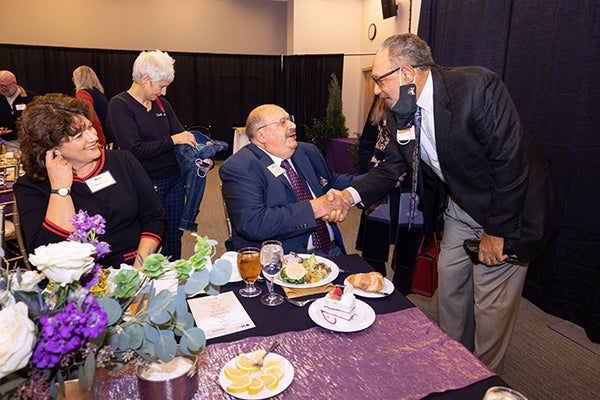ECU family medicine founder, educator leaves legacy
James G. “Jim” Jones, founding chair of the Department of Family Medicine in the Brody School of Medicine at East Carolina University, has died. He was 88.
Jones had a monumental impact on the field of family medicine and health care in eastern North Carolina, the state and beyond. After developing the family medicine program at ECU and becoming founding chair in 1976, he served in that role for two decades. He also held a variety of leadership roles that helped lay the groundwork for better health care and access for generations of North Carolinians.

James G. “Jim” Jones, center, was honored during a ceremony for the newly named James G. “Jim” Jones Chair’s Suite in East Carolina University’s Department of Family Medicine. (ECU photo by Rhett Butler)
“Through his work as a family physician and a leader in academic medicine, Dr. Jones truly embodied the spirit of ECU’s mission with a steadfast commitment to providing high quality access to health care,” ECU Chancellor Philip Rogers said. “Naming the Family Medicine Chair’s Suite for Dr. Jones earlier this year is a daily reminder of his legacy and how so many continue to benefit from his visionary leadership.”
A member of the Lumbee Tribe, Jones became the first American Indian to graduate from Wake Forest University’s Bowman Gray School of Medicine, as well as the first to become chairman of a clinical department in a medical school in the United States. Upon completion of his internship at Grady Hospital in Atlanta and residency with the U.S. Navy at Camp Lejeune, Jones established a thriving medical practice in Jacksonville. By 1972, he was named president of the North Carolina Academy of Family Physicians and led the academy in support of the establishment of a medical school at ECU.
Once the legislature approved the medical school, many wished Jones to become chair of the Department of Family Medicine, but he was reluctant to leave his private practice. ECU’s vice chancellor for health affairs, Edwin W. Monroe, was instrumental in convincing Jones to think seriously about the opportunity.
Jones continued his leadership in medicine by being elected the first American Indian president of the American Academy of Family Physicians (AAFP). In this role, he continued to inspire students to choose the specialty, to create the establishment of additional residency programs, and to encourage other family physicians to become leaders throughout the country.
Jones served as president of the American Academy of Family Physicians Foundation, the philanthropic arm of the AAFP, and established the James G. Jones Scholarship, which supports a medical student to attend the annual Political Leadership Institute in Washington, D.C. In 1999, Jones was lauded by UNC Pembroke, where he has served in multiple board leadership roles, with an honorary Doctor of Science degree.
Jones grew up in rural Robeson County under what he once described as “very humble circumstances.” Raised by his grandparents on a modest farm, Jones dreamed of being a medical missionary to Africa. As he endeavored to excel in his education, he was molded into a successful physician, beloved educator and key figure in state and national family medicine.
Earlier this year, ECU honored Jones during a ceremony for the newly named James G. “Jim” Jones Chair’s Suite in ECU’s Department of Family Medicine. In recognition of Jones’ distinguished career, friends and colleagues raised more than $333,000 to establish the Dr. James G. Jones Distinguished Professorship in Family Medicine in the ECU Brody School of Medicine.
Chelley Alexander, chair of the Department of Family Medicine, said Jones’ incredible work established the department as an invaluable asset to ECU and eastern North Carolina.
“I’m happy to report that ECU Family Medicine is thriving,” Alexander said at the ceremony. “We have trained over 400 family medicine residents since the start of the program that Dr. Jones envisioned.”
UNC Pembroke Chancellor Robin Gary Cummings, a friend, colleague and co-chair of the Jones endowment planning committee, described Jones as proof that circumstances do not determine where you go in life; they only tell where you start.
Cummings said Jones dreamed of following Albert Schweitzer and becoming a medical missionary in Africa. Instead, when it wasn’t popular to do, “he became our nation’s biggest advocate in family medicine,” Cummings said. “He, and a very select group, forced the N.C. General Assembly to look at health care in rural North Carolina.”
Jones said he thought of himself initially as destined to be a missionary. He believes his time as the founding chair of family medicine at ECU was God’s way of using his service.
“I found my destiny and I believe my place of service was not in Africa,” Jones said. “My mission field has been to create doctors for rural North Carolina.”